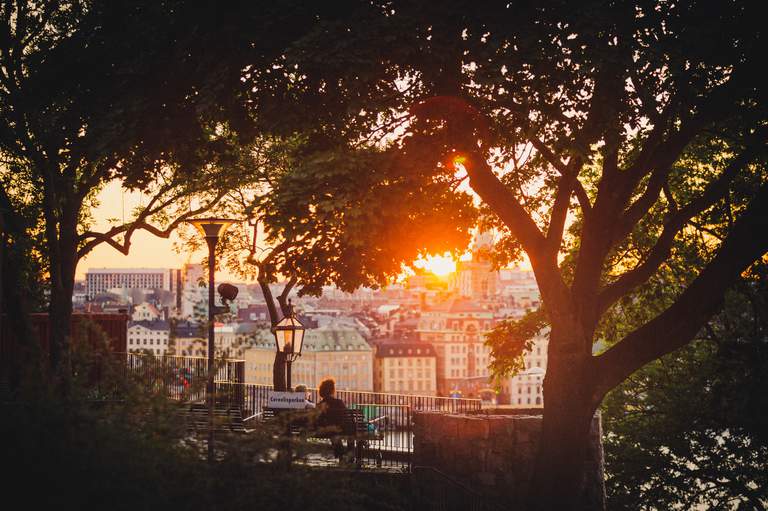What I’ve learned since moving to Stockholm
Publish date: 21 June 2022
I can’t quite recall what I expected Stockholm to be like before I moved here in July 2016. I’d never stepped foot on Scandinavian soil before the plane touched down, although I had already signed for an apartment and two weeks later was due to start a new job! All I knew was that I was keen to discover a new culture and different way of life. What I didn’t realise was how much I would also change in the process.
The first few weeks in any new place are always a haze of exciting new things. My first impression of the Swedes was that they were calm and polite and that the majority of them could have stepped off the front cover of a health and fitness magazine.
Perhaps the incident that took me most by surprise was when I met my new boss in person for the first time…and she hugged me. It’s not totally unheard of for colleagues to hug back in the UK (depending on your company’s HR policy!). Still, when meeting someone new in a professional setting, a handshake is considered more appropriate. I soon discovered that hugging colleagues and clients in Stockholm was pretty common. I’ve grown quite fond of this little quirk - it breaks down the barriers and makes you feel more at ease with each other which in turn leads to better, more creative work.
While Swedes, in general, are unerringly polite, that doesn’t mean we hold the same idea of what constitutes good manners. If someone holds a door open for you back in the UK, you had better bloody well say thank you. Hold the door for a Swede, and you’ll be lucky to get a nod of the head. It’s not because they’re rude and entitled, but because it’s more of a given that people should help each other out. Do you want to be congratulated for having common decency?
It didn’t take me long to realise was that better work/life balance doesn’t mean fewer hours and less output. It means being more productive with the allotted time so that your work doesn’t spill over into your free time.
One thing I did know about Sweden before I moved was that it was famed for having the best work/life balance in the world. In reality, I wasn’t quite sure what this meant. In the UK, to show you are committed to your job, you arrive earlier than contractually required and compete to be the last employee standing - or, more accurately, sitting - at the end of the day. More often than not, my weekends were spent in the pub or slouching around my flat. To me, better work/life balance sounded like shorter days and more time to slouch.
And so I was surprised - and I admit, disappointed at first - to find that the working hours at my first job in Stockholm were the 9 am-6 pm I was accustomed to. But what it didn’t take me long to realise was that better work/life balance doesn’t mean fewer hours and less output. It means being more productive with the allotted time so that your work doesn’t spill over into your free time. This includes making time to enjoy a coffee break (or two) during the working day - because who isn’t raring to work after a cinnamon bun and cup of strong Swedish java?
Moreover, depending on your workplace and its culture, you aren’t tied to your desk. Swedes are aware that sitting in front of your laptop doesn’t prove you’re working hard, and if you’ve finished your tasks for the day, it’s not a crime to clock off a bit early. They trust you’ll make up the time on a busier day. It’s a much healthier attitude to work, and once you discover it, there’s no going back.
Regarding the ‘life’ part of the work/life balance equation - Swedes value their free time and try to make the most of it all year round. Come sun or snow, they’re outdoors grilling sausages on the barbecue, swimming, hiking, or even just sitting on a park bench enjoying some fika in the open air. When I went walking in England, it was always on the promise that it would culminate in the pub. But when in Sweden, you learn to do as the Swedes do, and now I genuinely appreciate time spent in nature. I sometimes have to pinch myself when I’m walking through a Swedish forest and catch a deer out of the corner of my eye or when I’m swimming in a clear, deep lake on my lunch break. And this is all within the city limits or just on the outskirts!
The final thing I’ve learned but still haven’t quite got the hang of is that an ‘awkward silence’ doesn’t need to be awkward. Brits anxiously feel the need to fill a gap in conversation as though it were a dangerous pothole. In contrast, Swedes will quite contentedly smile at you until the conversation naturally flows again. I’ve come to suspect this habit might be key to better mental health and a generally calmer demeanour. Once I’ve mastered it, I’ll report back on this theory.
